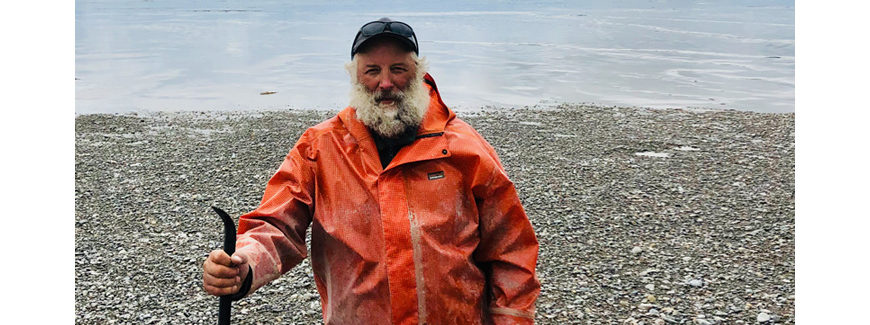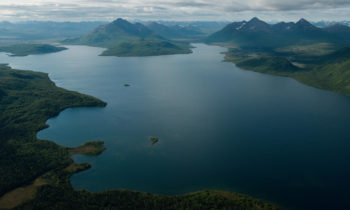Read the first part of this two-article series. Top photo: Kevin Scribner.
I belong to a food movement called Slow Food, with a tributary called Slow Fish. Slow Food began in Italy, in the late 1980’s, as a reaction to the McDonald’s fast food chain showing up in Rome. Slow Food & Fish has three simple, compelling principles: good food, clean food, and fair food (more about these principles). Slow Food & Fish also embrace three values: equity, inclusion, and justice, rallying around a theme of JOY + JUSTICE.
We Slow Food & Fish folks believe we are what we eat, and joyfully so. I also believe we are from where we eat. When you eat Bristol Bay salmon, you become connected to Bristol Bay. No matter where you are, how near or far from Bristol Bay, you become one with the Bay’s communities, the salmon, and the entire ecosystem. You join We Are Bristol Bay.
We Are Bristol Bay
There are many faces in the Bristol Bay area, and we are joined by thousands, if not millions more, who eat Bay salmon, earn income from the fishery and food system these salmon supply, and who are on record as informing the EPA that they support life, the salmon, the fishery in the Bay, not the toxicity of Pebble Mine. We Are Bristol Bay, we are legion, and we are joyful! Check out some of the many faces of the Bay in this “sea-swallow’d” video.
But wait… Bristol Bay is under threat by the development of the Pebble Mine. What is this all about? A gold/copper/molybdenum mining claim in the heart of Bristol Bay, smack dab in the middle of the world’s most prolific sockeye salmon ecosystem on the planet? How can this be? Who’s behind this horror story?
The spokesperson for the Pebble Mine speaks comfortably—one could say casually, no, even glibly—of how the mine will change the Bay’s waters and landscape without affecting the Bay’s salmon ecosystem. Peer-reviewed assessments by scientists beg to differ.
“In conclusion, as fishery scientists and resource managers, we are concerned that the DEIS [Pebble Mine Draft Environmental Impact Statement (DEIS) released by the U.S. Army Corps of Engineers (USACE)] will clear the way for a project whose impacts to highly valued fisheries and the watershed were not adequately evaluated and therefore cannot be adequately considered, reduced, or mitigated. We do not believe the impacts and risks to fish and fish habitat have been fully described and we disagree with many conclusions reached based on the available data and ecological knowledge. Bristol Bay’s unimpaired watersheds and sustainable commercial, recreational, and subsistence fisheries represent an exceptionally rare resource of national and global importance. The potential scope of the project is so vast that it would forever alter the Bristol Bay region and its fisheries resources, including the extraordinarily prolific and all-wild salmon fisheries. Consequently, until an acceptable scientific evaluation can be completed and reviewed, we recommend the No Action Alternative as the best path forward.”
Comment letter from American Fisheries Society (AFS), the Western Division of AFS, and the Alaska Chapter of AFS. “AFS represents over 7,500 professional fishery scientists and resource managers who work in the private sector, in academic institutions, and in Tribal, state, and federal agencies. Our common mission is to improve the conservation and sustainability of fishery resources and aquatic ecosystems by advancing fisheries and aquatic science and promoting the development of fisheries professionals.”
Our Children’s Children’s Children’s Children’s Children’s Children’s Children
Seven Generations — my Native American colleagues have taught me to think of the future in this way. It’s certainly a challenge to get a good grasp of the future, much less plan for it. And it gets downright brain boggling if we try to wrap our minds around the concept of forever. So, instead, let’s think in terms of seven generations, or roughly 200 years, calculating 30 years per generation.
It is with ease that I can envision the Bristol Bay salmon running abundantly for the next 200 years—and effortlessly I can envision this going on for time immemorial—if we only let them do so. On the other hand, I can’t, for the life of me, envision the toxic residue from a Pebble Mine being safely contained in a reservoir for forever, much less 200 years.
The arrogance of anyone calmly proclaiming that the toxic aftermath of Pebble Mine will be confined and taken care of forever… can this ever pass the laugh test? Isn’t this a proclamation more suited for the theater of the absurd?
The history of large hard-rock mining in the US is less than seven generations old. We haven’t even seen 200 years since the passing of the now woefully archaic and inadequate Federal Mining Act of 1972. Throughout our nation there are abandoned, unfixed mines leaking toxics into river systems. In the past five years, we’ve had three very substantial, poisonous blow-outs of so-called safe and durable dams holding back toxic mine waste slurry in their reservoirs, one in Canada, two in Brazil.
Do we have an example (at least one?) of a mining company managing its toxic aftermath for forever, for time immemorial? Much less being in business for seven generations, for 200 years? The landscape is littered with mines deserted by companies declaring bankruptcy, leaving clean up and restoration to the public. To learn more, go to EPA’s own Abandoned Mine Lands section of its Superfund Program.
We Are The Past Of Our Descendants
My Native American colleagues also say, “we are the past of our descendants,” another reminder of our current responsibilities. Yes, every day now we are making history for our descendants. Soon we will all become the story of their past. You Who Are Pebble Mine, what history will you gift your descendants? What relationship to the Bay do you want them to inherit? We Are Bristol Bay can answer this clearly: we choose life, choose salmon, for seven generations, for forever.
Finally: Doing The Math
Will you join We Are Bristol Bay to guarantee the Pebble Mine permitting process is held to the highest standards of science, decency and dignity? And to support a permitting process that honors the principles of democracy that have truly made America great, a process that counts the votes?
Tallies-to-date:
- 80%+ of Bristol Bay residents oppose the Pebble Mine
- 65%+ of Alaska residents oppose Pebble
- 70%+ of public comments (over 700,000) supported EPA’s Watershed Assessment which projected unacceptable harm to Bristol Bay ecosystem from a Pebble Mine operation
- Over 1 million comments opposing Trump’s EPA’s proposed revoking of the determination to invoke the Federal Clean Water Act’s highest standards in protection of the Bristol Bay ecosystem
- Two: the number of people in Air Force One that made a deal in June of this year, to disregard the sentiments expressed by the many above, to revoke the proposed EPA determination of the Clean Water Act’s role in Pebble permitting, including ordering EPA Headquarters to squash their very own 170 page report that identified the numerous shortfalls of the current Army Corps of Engineers Draft Environmental Impact Statement on the projected impact of the Pebble Mine. This damning report of the DEIS joins those from the US Department of the Interior, US Fish & Wildlife Agency, Bristol Bay Native Corporation, Trustees for Alaska, United Tribes of Bristol Bay, Bristol Bay Borough Chamber of Commerce, National Parks Conservation Association, and more. The collection wisdom and experience of these entities is impressive indeed, when compared to just two people making a so-called deal.
- $1.5 billion is generated every year by the Bristol Bay salmon fishery. Multiply this by 4,000 years (remember the EPA Bristol Bay Watershed Assessment’s declaration of 4,000 years of salmon fishing). and the expected economic value of Bristol Bay is six trillion dollars. And guess what, to realize this value we don’t have to generate and then manage (forever) any toxins, or restore any land or water. No, we will simply continue the sustainable management that has guided this fishery into being the salmon rock star of the planet. The value of Pebble Mine pales in comparison—and the mine’s development requires so much expensive and damaging effort, including constructing of miles of roads, a power plant, and otherwise unnecessary ports of call.
So I say, let’s do the math, do the science, and listen carefully to the many personal stories. Let’s do what’s right while there’s still time: line up on the sustainable side of history. Oppose the Pebble Mine. Choose life. Choose salmon over mining in Bristol Bay. Please, I plead with you to do so, as this is very, very personal, to me and many others, including many of our grandchildren, and their children’s children’s children’s children’s children.
Join WE ARE BRISTOL BAY
To learn about Bristol Bay and the very real threat of the Pebble Mine, refer to these resources:
- THE FACTS
- THE WILD film trailer: How Do You Save What You Love?



